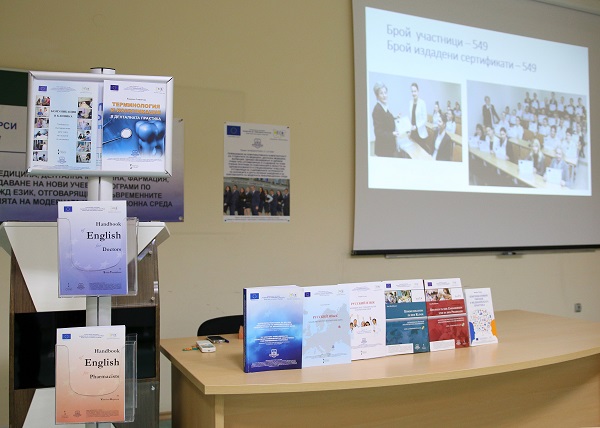Education, fully consistent with the real
needs of business - this is one of the key priorities laid down in the training
of students at Medical University - Varna. Pursuing this policy, the Varna
higher school draws the attention to how doctors and health professionals trained
there should communicate with their future patients. This is the basis of the two-year
project under OP "Human Resources Development", aimed at optimizing
and updating the curricula on communication.
 After completing the project, the higher
school can boast the updating of a total of 20 curricula in Medicine, Dental
Medicine, Pharmacy, Health Management (Master and Bachelor), Pharmaceutical Management,
Management of Health Care and Medical Cosmetician. Parallel to this, the team has developed
and issued 10 unique manuals in Bulgarian, English, German and Russian, with a
wide range of audio and visual materials for the development of individual
communication skills of both Bulgarian and international students. (Currently nearly
900 international students from 43 countries around the world are studying at MU-Varna.)
After completing the project, the higher
school can boast the updating of a total of 20 curricula in Medicine, Dental
Medicine, Pharmacy, Health Management (Master and Bachelor), Pharmaceutical Management,
Management of Health Care and Medical Cosmetician. Parallel to this, the team has developed
and issued 10 unique manuals in Bulgarian, English, German and Russian, with a
wide range of audio and visual materials for the development of individual
communication skills of both Bulgarian and international students. (Currently nearly
900 international students from 43 countries around the world are studying at MU-Varna.)
"In
our country, unfortunately, quite often we have witnessed or we ourselves have been in situations of improper communication between
doctors and patients. The pending
problem could be solved by means of
proper training," reminded the project manager Assoc. Prof. Violeta Tacheva, during the final
information meeting, which took place on 18 March 2015, at MU-Varna. "Even before getting into a real working environment, future medics
have to know a lot not only about medical science but also they must have solid
skills in the art of communicating with their patients, they need to be aware
of the specific situation, the intercultural differences", pointed out
Assoc. Prof. Tacheva.
"In Germany, for
example, the proper communication with patients is extremely important - it is
unacceptable to talk to the patient informally, and a common reason for the dismissal
of a doctor can be precisely the poor communication with the patient," said
the Director of the Centre for Electronic and Distance Learning at MU-Varna
Assoc. Prof. Ivan Merzhdanov. "In some German provinces the examination in
communication of the medical student is conducted in a real environment with a
patient who has to be diagnosed, and the student is assessed by both a doctor
and a philologist."
The full title of the
project, which is worth 276 317 lev, is "Increasing the communicative
competence of students in Medicine, Dental Medicine, Pharmacy, Health Management
and Health Care through optimizing and creating new training programmes in
communication in the field of health care and specialized foreign language,
meeting the modern needs of hospitals and other medical institutions and the
requirements of the modern information environment - BG051PO001-3.1.07-0061".
As a result of the project,
besides the updating of the curricula and the issuance of specific aids for the
needs of the training, a change in the examination form of the subject Communicative
Competence has been achieved. Furthermore, in the future,
students will already have the opportunity to include the subject as an elective.
"The
language can treat as well. If a doctor
talks to a patient calmly, with understanding and attention, undoubtedly the patient will feel better, no matter what their suffering is",
concluded the project leader Assoc. Prof.
Tacheva.
